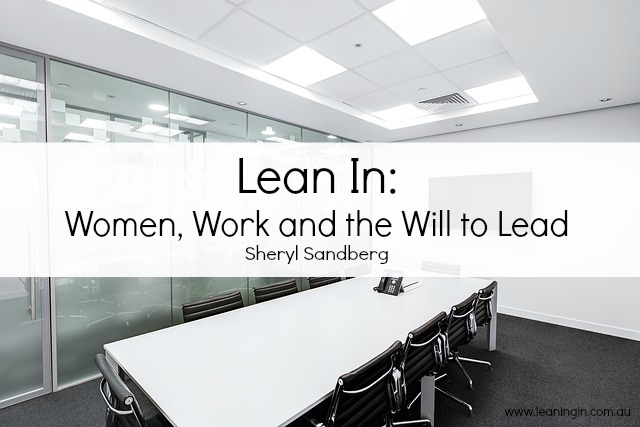It will come as no surprise that Sheryl Sandberg’s Lean In: Women, Work and the Will to Lead makes it on the list of Books I Love.
Sandberg wrote Lean In after the response to her 2010 TED Talk, Why we have too few women leaders. In the book, Sandberg shares research and personal stories to highlight gender differences in the workplace. She examines why there are still fewer women in leadership roles than there are men, and, controversially, she suggests that women take charge of their circumstances and focus on what they can do as individuals to take charge of their own path and, ultimately, change the percentages at the top.
Key messages
The three key messages mirror those in her TED Talk: ‘sit at the table’, ‘make your partner a real partner’ and ‘don’t leave before you leave’
Sit at the table
Sandberg’s key message is that women should ‘sit at the table’ and ‘lean in’, both literally and figuratively. Women should not hold themselves back. They should have the confidence to speak up, despite the fact that research shows that successful women and likeability are negatively correlated.
If a woman pushes to get the job done, if she’s highly competent, if she focuses on results rather than on pleasing others, she’s acting like a man. And if she acts like a man, people dislike her. In response to this negative reaction, we temper our professional goals.
Sandberg challenges the double-standard whereby, although men and women both have multiple responsibilities, it is only women who ‘have to endure the rude questions and accusatory looks that remind us that we’re shortchanging both our jobs and our children.’

Make your partner a real partner
Sandberg encourages men and women to treat their partners as true equals. Research shows that even where a husband and wife are both employed full-time, the mother does more housework and childcare than the wife. But what I love about Sandberg’s point is that she doesn’t just point the finger at men saying that they need to do more. Instead, she acknowledges that women have part to play in this too. Many women discourage their husbands from contributing through ‘maternal gatekeeping’ – in other words, being too controlling or critical.
The point is this: ‘As women must be more empowered at work, men must be more empowered at home.’ If men contribute more at home, women let them do so and society accepts this as the norm (by, for example, offering paternal leave as well as maternal leave and accepting fathers in social circles traditionally seen as the realms of mothers) we can redefine the norm for generations to come.
As more women lean in to their careers, more men need to lean in to their families. We need to encourage men to be more ambitious in their homes. We need more men to sit at the table … the kitchen table.

Don’t leave before you leave
Sandberg argues that the most pervasive way in which women hold themselves back is that they ‘leave before they leave’. She says that women begin making accommodations and sacrifices that they believe will be necessary to enable them to have a family long before they are even ready to have children. They may not take a promotion or apply for a new role in order to make room for a child they may have at some point in the future. As a result, when women do have children and return to the workplace, they feel less fulfilled and more likely to leave their jobs. According to Sandberg, the time to lean back is when the child arrives, not before.

Criticisms
One of the most common criticisms of Lean In is that Sandberg is too focused on individual behaviour rather than challenging social and workplace structures which disadvantage women. According to one critic, ‘Sandberg does not serve other women well by pretending that companies are a meritocracy that just requires individual effort’.
I agree that many social and workplace structures should be reformed, however that does not take away from Sandberg’s message that women should do more to advocate for themselves. She is not writing a book about what society should do for women, She is writing about what we can do for ourselves. We have to start somewhere!
Another common criticism is that Sandberg’s advice is elite and out-of-touch with the struggles of average women who do not have Sandberg’s wealth and who are raising children, running a home and working to support their families. I accept that not all women are in positions that enable them to make demands for flexibility, maternity leave or even to ‘sit at the table’. However, there are many women who are in these positions and who have and continue to greatly benefit from Sandberg’s advice. The fact that her message is not universally applicable should not discount the fact that it is sound advice for some. Sandberg is very clear that her vision of more women at the top will impact those below:
I believe that if more women lean in, we can change the power structure of our world and expand opportunities for all. More female leadership will lead to fairer treatment for all women.
While I don’t agree with all of Sandberg’s points, her book is a well-researched and thoughtful reflection female leadership today. I completely agree that if we want to change anything in our lives, the best place to start is with ourselves. It isn’t enough to wait for society to change around us. This applies as much to men as it does to women. In some ways, I interpret Sandberg’s message as saying ‘just get on with it’. If you want to have a successful career, you need to put yourself out there, speak up and forget about pleasing others. As Sandberg says, ‘What would you do if you weren’t afraid?’.




9 Responses
Can I just say that I am a bit obsessed with your logo. Like I LOVE IT!
Thanks for linking up at #globalblogging
Thanks Kristin! I’d love to take the credit, but I paid someone to do it 🙂
I love the idea that men need to lean into their families more. I’m really lucky to have a very supportive partner – he actually does most of the childcare/household stuff because I have a more stable career. I agree that there are systemic issues that disadvantage women (childcare costs and lack of flexible working being some of the biggest ones), but that doesn’t mean women can’t take steps that will help make them more successful. #DreamTeam
That’s exactly right – we need to tackle these issues from all angles, not just blame the individual/society/organisation/system. Thank you commenting
Great review. I couldn’t agree more – there are some great take-aways and somethings that I don’t agree with. But overall it’s a well balanced book. For me the “‘don’t leave before you leave” mantra has been key. It has really forced me to think about my career rather than musing on whether I may or may not choose to have another child (which is not something happening any time soon). As it happens I have decided to expand my skills and depth of knowledge in my current role rather than trying to step up the ladder. However, this is an active choice based on my working patterns and level of availability. NOT because I might not be here in 18 months. #DreamTeam
Thanks Angela. I love the ‘don’t leave before you leave’ too. I’d really like another child, but that doesn’t mean I’m going to give up on my career before that child is here either. Even just being aware of the reasons why we make certain decisions is so important. As you say, you’ve made a decision to go one way with your career, but you’re conscious that you haven’t made that choice because you may one day choose to have another child. I love this stuff, I find it all so interesting!
A really comprehensive and helpful review as I don’t know when I’ll get round to reading this even though I really want to! Thank you. xx #globalblogging
This sounds like a really powerful read and I agree to an extent that we need to grab the challenge head on and make our own success. I do also agree with the point that “successful women and likeability are negatively correlated.” Society does still have a hufew way to move forward. Great review. Thanks for linking up with us. #DreamTeam x
It really is sad – and it’s such a shame that women do seem to have to work that much harder to get the respect that they deserve. (When I say that I agree with the statement I don’t mean that I personally find success and likeability negatively correlated – I’ve just read my comment back and realised that it could be read that way. I just mean that I can see how research would suggest that theory across society which I think is very unjust.) Anything that empowers women to ‘lean in’ is to be applauded in my opinion. Thanks again for linking. Dx